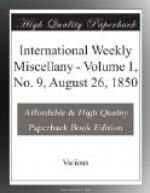“The foot-soldier who has discharged his musket is lost when opposed to the Csikos. His bayonet, with which he can defend himself against the Uhlans and Hussars, is here of no use to him; all his practiced maneuvers and skill are unavailing against the long whip of his enemy, which drags him to the ground, or beats him to death with his leaden buttons; nay, even if he had still a charge in his musket, he could sooner hit a bird on the wing than the Csikos, who, riding round and round him in wild bounds, dashes with his steed first to one side then to another, with the speed of lightning, so as to frustrate any aim. The horse-soldier, armed in the usual manner, fares not much better; and wo to him if he meets a Csikos singly! better to fall in with a pack of ravenous wolves.”
* * * * *
THE PRESENT RELIGION OF PERSIA.
An account of the Expedition for the survey of the rivers Euphrates and Tigris, carried on by order of the British Government, in the years 1835, 1836, and 1837; preceded by geographical and historical notices of the regions situated between the Nile and the Indus, with fourteen maps and charts, and ninety-seven plates, besides numerous woodcuts, has just appeared in London, in four large volumes, from the pen of Lieutenant-Colonel Chesney, R.A., F.R.S., &c., commander of the Expedition. It is too comprehensive a work ever to be reprinted here, or to be much read, even in England, but it is undoubtedly very valuable as an authority. The following paragraphs from it describe the present state of religion in Persia:
“The title of Mulla is conferred on a candidate by some member of the order, after the requisite examination in theology and law; and the person is then intrusted with the education of youth, as well as the administration of justice, and the practice of law. The Mullas sometimes possess sufficient power not only to influence the people at large, but even the King himself.
“Of this class of priests, those who have been successful in life are either placed in mosques or private families, waiting for advancement; but a greater number are nominally attached to colleges, and live by the practice of astrology, fortune-telling, the sale of charms, talismans, &c. They who are not possessed of the requisite ingenuity to subsist by the credulity of others, take charge of an inferior school, or write letters, and draw up marriage and other engagements, for those who are unequal to the task. They mix at the same time largely in the domestic concerns of families. But in addition to these and other vocations, a considerable number of the lowest priests derive a scanty support from that charity which no one denies to the true believer. These men wander as fakirs from place to place, carrying news, and repeating poems, tales, &c., mixed with verses from the Koran. The heterodox religions are very numerous; nor is Irian without her free-thinkers,




